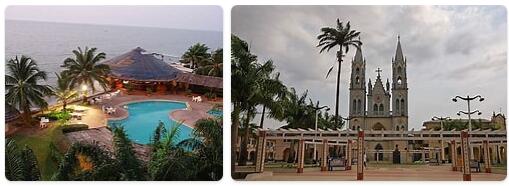The main problems when visiting the country are usually related to traffic accidents, theft and profit crime, and a poor health service. Travelers are encouraged to take reasonable precautions and limit traffic at night, especially outside the capital, Conakry.
Safety
The most serious risks associated with visits to the country are traffic accidents, theft and profit crime and a poor health service. Travelers are encouraged to take the necessary precautions to suit the current situation. Night traffic should be avoided, especially outside the capital, Conakry.
There are several known cases of fraud and extortion of foreign nationals in Guinea. There is widespread internet fraud in West Africa, and it is warned against contacting the Internet with people you do not know. Visitors are encouraged to take the necessary precautions during their stay in the country and to avoid situations that could lead to extortion and threatening incidents.
Avoid taking pictures of people without permission. Photo equipment, including cell phones, must not be used near military facilities. Local traditions and customs should be respected.
There is no particular danger to natural disasters in Guinea, but in some areas flooding and drought are a regular problem.
Norwegian citizens staying in or planning a trip to Guinea are encouraged to register their travel via www.reiseregistrering.no

Entry
Please note that entry regulations may change. The Foreign Service is not responsible if the following information on entry regulations or visa requirements is changed at short notice. It is the responsibility of the traveler to ensure that travel documents are valid for entry and to familiarize themselves with the current entry rules for each country.
Norwegians need a visa to stay in the country, and a visa must be applied for in advance. The passport must be valid for the entire stay and six months after departure. The closest embassy to Guinea is in Paris.
A valid vaccination card must be presented on arrival. Contact your doctor or vaccination office well in advance of your trip to get the necessary vaccines and information on malaria.
Health
Guinea was severely affected by the Ebola epidemic in 2015. For up-to-date information and health advice on Ebola – see the website of the Institute of Public Health.
WHO has warned that polio is on the rise again in several countries. To prevent the spread of polio, Norwegian health authorities provide travel advice on polio vaccination before staying in these countries, and especially if staying for more than four weeks. Guinea has had local outbreaks of polio. Read more on the Institute of Public Health’s website.
It should also be noted that health care is limited and in general poor condition so that one must consider traveling to Europe for medical treatments and surgeries.
Guinea is a malaria area. Contact your doctor or vaccination office well in advance of your trip to get the necessary vaccines and information on malaria. Please note that a valid vaccination card, especially for yellow fever, must be presented on arrival. Check the Public Health Institute’s pages for updated information.
Practical information
Norway is represented by the Honorary Consulate General in Conakry, and this consulate is jointly with Sweden. The Norwegian Embassy responsible for Guinea is the embassy in Accra. There is limited capacity for monitoring Norwegian nationals in the country. The UD’s 24-hour operational center in Oslo can be contacted on tel. +47 23 95 00 00 in case of emergency. According to allcitycodes, Guinea area code is +224.
Official name is R¨¦publique de Guin¨¦e. The capital is Conakry, and the country is sometimes referred to as Guinea-Conakry. Other important cities are N’Z¨¦r¨¦kor¨¦, Gu¨¦k¨¦dou, Kankan, and Kindia.
French is the official language of Guinea, while other languages include peulh (full), mandink¨¦ and soussou. Islam is the most important religion (85 percent).